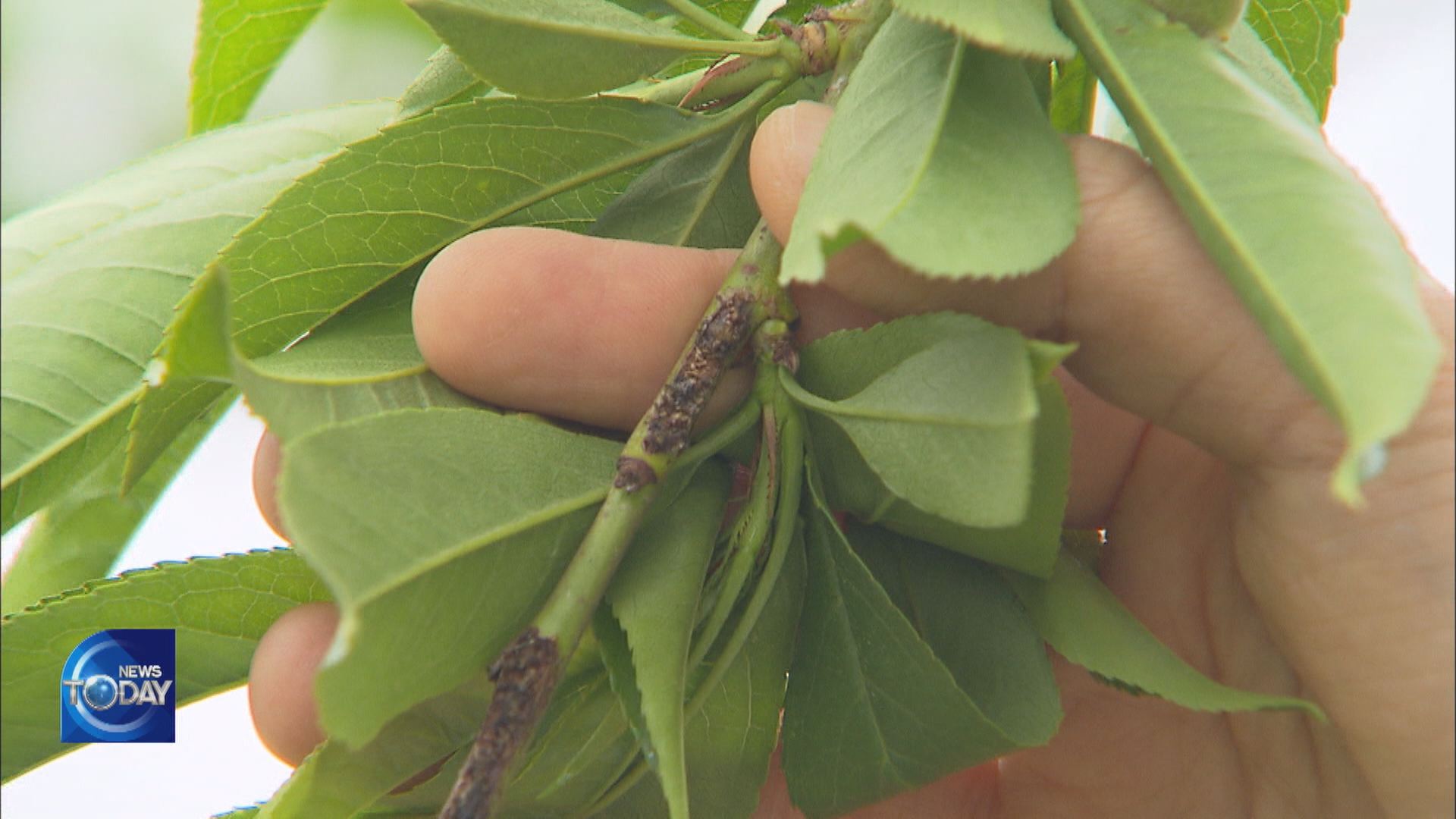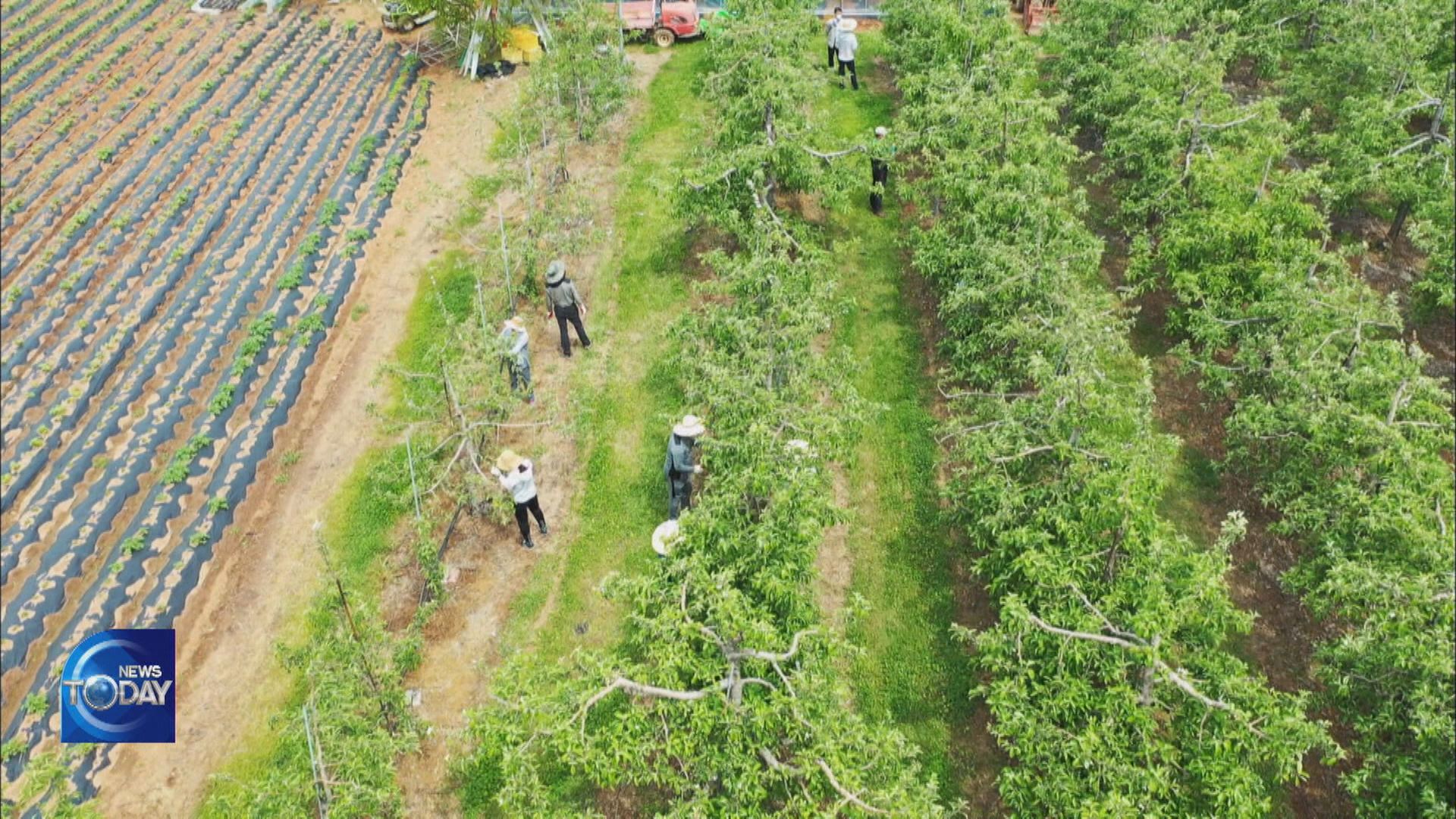PESTS AFFECTING FARM LAND
입력 2021.05.10 (15:05)
수정 2021.05.10 (16:48)
읽어주기 기능은 크롬기반의
브라우저에서만 사용하실 수 있습니다.
[Anchor Lead]
Exotic pests such as the spotted lanternfly and the citrus flatid planthopper have caused extensive losses to farmers by multiplying dramatically every year. These pests are expected to make an earlier appearance this year due to unseasonably high temperatures.
[Pkg]
Pest control work is underway at a plum orchard. A truck sprays pesticide over the grounds. This is prevent the outbreak of exotic pests that cause extensive damages to orchards every year. The spotted lanternfly feeds on the sap from the branches or fruits, stunting the growth of fruit trees. The black planthopper and the citrus flatid planthopper also suck sap from plant branches. Such pests were expected to hatch in early to mid-May this year, about ten days earlier than the year before. The unseasonably high temperatures in the spring caused the insects’ eggs to hatch earlier than usual and spread widely.
[Soundbite] Kim Jin-seok(Cheongju Office of Meteorology) : "Except for a short cold spell in mid-April, the temperatures have been generally higher than in previous years. Especially in late April the Cheongju region in Chungcheongbuk-do Province recorded a high of 29.7℃ like in early summer."
Orchard farmers suffer extensive damage from these pests as they lay eggs in clusters and cause sooty mold in trees by feeding on the fruits or secreting excrements.
[Soundbite] Lee Seong-kyun(Researcher, Chungcheongbuk-do ARES) : "The pests must be contained before they hatch, but the hatching time varies greatly by orchard locations. Egg clusters must be removed before they hatch."
Experts advise farmers to check fruit trees regularly and spray pesticides in accordance with each region’s pest-hatching timetable.
Exotic pests such as the spotted lanternfly and the citrus flatid planthopper have caused extensive losses to farmers by multiplying dramatically every year. These pests are expected to make an earlier appearance this year due to unseasonably high temperatures.
[Pkg]
Pest control work is underway at a plum orchard. A truck sprays pesticide over the grounds. This is prevent the outbreak of exotic pests that cause extensive damages to orchards every year. The spotted lanternfly feeds on the sap from the branches or fruits, stunting the growth of fruit trees. The black planthopper and the citrus flatid planthopper also suck sap from plant branches. Such pests were expected to hatch in early to mid-May this year, about ten days earlier than the year before. The unseasonably high temperatures in the spring caused the insects’ eggs to hatch earlier than usual and spread widely.
[Soundbite] Kim Jin-seok(Cheongju Office of Meteorology) : "Except for a short cold spell in mid-April, the temperatures have been generally higher than in previous years. Especially in late April the Cheongju region in Chungcheongbuk-do Province recorded a high of 29.7℃ like in early summer."
Orchard farmers suffer extensive damage from these pests as they lay eggs in clusters and cause sooty mold in trees by feeding on the fruits or secreting excrements.
[Soundbite] Lee Seong-kyun(Researcher, Chungcheongbuk-do ARES) : "The pests must be contained before they hatch, but the hatching time varies greatly by orchard locations. Egg clusters must be removed before they hatch."
Experts advise farmers to check fruit trees regularly and spray pesticides in accordance with each region’s pest-hatching timetable.
■ 제보하기
▷ 카카오톡 : 'KBS제보' 검색, 채널 추가
▷ 전화 : 02-781-1234, 4444
▷ 이메일 : kbs1234@kbs.co.kr
▷ 유튜브, 네이버, 카카오에서도 KBS뉴스를 구독해주세요!
- PESTS AFFECTING FARM LAND
-
- 입력 2021-05-10 15:05:37
- 수정2021-05-10 16:48:42

[Anchor Lead]
Exotic pests such as the spotted lanternfly and the citrus flatid planthopper have caused extensive losses to farmers by multiplying dramatically every year. These pests are expected to make an earlier appearance this year due to unseasonably high temperatures.
[Pkg]
Pest control work is underway at a plum orchard. A truck sprays pesticide over the grounds. This is prevent the outbreak of exotic pests that cause extensive damages to orchards every year. The spotted lanternfly feeds on the sap from the branches or fruits, stunting the growth of fruit trees. The black planthopper and the citrus flatid planthopper also suck sap from plant branches. Such pests were expected to hatch in early to mid-May this year, about ten days earlier than the year before. The unseasonably high temperatures in the spring caused the insects’ eggs to hatch earlier than usual and spread widely.
[Soundbite] Kim Jin-seok(Cheongju Office of Meteorology) : "Except for a short cold spell in mid-April, the temperatures have been generally higher than in previous years. Especially in late April the Cheongju region in Chungcheongbuk-do Province recorded a high of 29.7℃ like in early summer."
Orchard farmers suffer extensive damage from these pests as they lay eggs in clusters and cause sooty mold in trees by feeding on the fruits or secreting excrements.
[Soundbite] Lee Seong-kyun(Researcher, Chungcheongbuk-do ARES) : "The pests must be contained before they hatch, but the hatching time varies greatly by orchard locations. Egg clusters must be removed before they hatch."
Experts advise farmers to check fruit trees regularly and spray pesticides in accordance with each region’s pest-hatching timetable.
Exotic pests such as the spotted lanternfly and the citrus flatid planthopper have caused extensive losses to farmers by multiplying dramatically every year. These pests are expected to make an earlier appearance this year due to unseasonably high temperatures.
[Pkg]
Pest control work is underway at a plum orchard. A truck sprays pesticide over the grounds. This is prevent the outbreak of exotic pests that cause extensive damages to orchards every year. The spotted lanternfly feeds on the sap from the branches or fruits, stunting the growth of fruit trees. The black planthopper and the citrus flatid planthopper also suck sap from plant branches. Such pests were expected to hatch in early to mid-May this year, about ten days earlier than the year before. The unseasonably high temperatures in the spring caused the insects’ eggs to hatch earlier than usual and spread widely.
[Soundbite] Kim Jin-seok(Cheongju Office of Meteorology) : "Except for a short cold spell in mid-April, the temperatures have been generally higher than in previous years. Especially in late April the Cheongju region in Chungcheongbuk-do Province recorded a high of 29.7℃ like in early summer."
Orchard farmers suffer extensive damage from these pests as they lay eggs in clusters and cause sooty mold in trees by feeding on the fruits or secreting excrements.
[Soundbite] Lee Seong-kyun(Researcher, Chungcheongbuk-do ARES) : "The pests must be contained before they hatch, but the hatching time varies greatly by orchard locations. Egg clusters must be removed before they hatch."
Experts advise farmers to check fruit trees regularly and spray pesticides in accordance with each region’s pest-hatching timetable.
이 기사가 좋으셨다면
-
좋아요
0
-
응원해요
0
-
후속 원해요
0

















이 기사에 대한 의견을 남겨주세요.